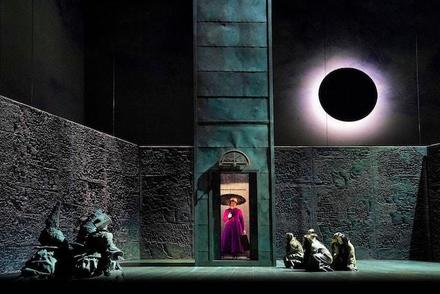Eurydice: My boyfriend called himself Orpheus, because he was a musician. (I know, I know.) He could be so weird sometimes, it seemed almost like there were TWO of him, but I guess I loved him. I kind of died, and after a while I started to LIKE the deep place I went to, because my dad was there, and the people were so funny, and the way they dressed was amazing, and you would not BELIEVE the scenery, it was like being in some movie temple with a big moon changing colors all the time -- I mean, seriously, WOW. Did I miss Orpheus? Of COURSE. And I know he missed me, because he came to get me! So Orpheus hustled down, all romantic and ready to pull any stunt, singing his head off and charming everyone from the mayor to the watchdog. Thing was, though, the deep place has this rule that if a guy picks up a girl for a trip, he can't look back at her. Dumb, right? Orpheus brought me right up to the state line, and then . . . he TOTALLY looked back, it was like he did it on purpose! And I suppose I still could have gone with him -- I mean, what were they going to do, arrest us over some bogus old rule? But at that point I was just, like, ugh. I think he's gay.
The audience: Eurydice is right -- the detailed, dramatically shaded scenery and costumes kept us spellbound; big praise for set designer Daniel Ostling and costume designer Ana Kuzmanic. And we liked the modernistic twists and ghostly insubstantiality of Matthew Aucoin's score, which made us feel as if flames and specters were jumping up all around us. But there were a few things we didn't understand. The main one was the vocalization: The bellowing vibrato of Italian opera didn't hang well on the wiry framework of young Aucoin's music, and it made the projected supertitles absolutely necessary -- we could comprehend little aurally, even though the words were in English. Also, Aucoin could have written his own libretto (which he has done before) rather than tapped the almost unaltered text of Sarah Ruhl, whose cadences resisted adaptation. The words' deliberate naiveté served well in her own play of "Eurydice." "Don't books have rhythm?" said the lost girl, and although the answer was yes, Aucoin was left to marry his own notes with her raw syllables, and the jagged result was an all-too-accurate reflection of Ruhl's boy-girl tension. A constant battle raged: the grandeur of the set and the inventive sensitivity of the orchestral parts against the poetically perceived everyday love story. If this was what it meant for the Artist's transcendent urge to be interpreted from his girlfriend's point of view, neither received full justice. Mainly, myth got missed.
* * *
"Eurydice" continues through February 23; details at www.laopera.org.

